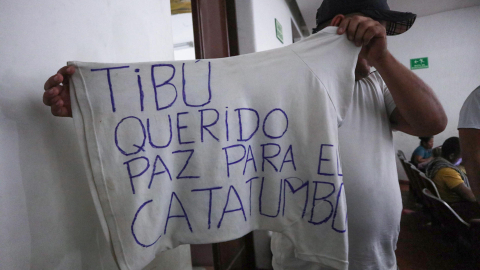Crisis in Colombia: Cúcuta Becomes a Symbol of Suffering Amid ELN and FARC Clashes in Catatumbo
Cúcuta, a border city in Colombia, has become a heartbreaking symbol of the human toll caused by the ongoing armed conflict in the Catatumbo region. Over the past few days, the city has seen a significant influx of displaced people fleeing violence caused by clashes between the National Liberation Army (ELN) and dissidents from the Revolutionary Armed Forces of Colombia (FARC).
Families, many with young children and pets, have arrived exhausted and distressed, seeking refuge from the escalating violence. The city of Cúcuta, located in Norte de Santander, has opened its arms to these victims of conflict. Since the violence erupted, over 80 people have died, and more than 20 others have been injured, according to local authorities.
A New Refuge for the Displaced
The General Santander Stadium, normally used for Sunday football matches, has transformed into an emergency shelter. On January 19, 2025, nearly 2,000 displaced people gathered there, desperately seeking protection as the humanitarian crisis deepens with each passing day.
One of these displaced people, Doña María (a name changed for safety), tearfully shared her pain. She had to leave La Gabarra with her children and grandchildren, leaving behind not only her home but also her livelihood. “In Cúcuta, we have no family, so we came here hoping for help,” she said. What hurt the most was leaving behind her farm with 14 pigs and chickens, her primary source of sustenance.
Even more distressing, Doña María's daughter has not been able to leave La Gabarra due to a lack of security and transportation. "I spoke with her this morning, and she’s still there,” she said, filled with worry.
Desperate for Safety
As the hours pass, more families arrive, looking weary and desperate. Fathers carry their little ones in their arms, while children, despite the adversity, try to find joy in the midst of chaos. Many have been forced to leave everything behind—homes, land, and memories—because of the ongoing violence.
Local Response to the Crisis
In response to the growing crisis, Cúcuta’s municipal government has activated a route to assist displaced persons. Since Saturday, the authorities have helped 2,790 people at the Municipal Palace, working together with organizations like the People’s Defender, the Red Cross, and international groups.
Efforts to provide essential aid such as food, clothing, and medical attention are ongoing, and the city’s mayor, Jorge Acevedo, launched a donation campaign called “United for Catatumbo,” aiming to collect non-perishable food, clothing, shoes, and toiletries.
Health authorities have also declared a yellow alert, focusing their efforts on addressing the medical and humanitarian needs of the displaced individuals.
Fear and Uncertainty
A mother with three young children shared her harrowing experience of fleeing her home in the Castrillón area. She encountered more people on the road heading toward Tibú, but she decided to keep moving toward Cúcuta for safety. “We had no other choice. The fear was stronger than anything we could carry with us. We barely brought any clothes,” she said, holding her children close.
The conflict between the ELN and FARC dissidents, which began on Thursday, has caused thousands of rural residents to flee to urban centers like Cúcuta, Ocaña, and Tibú, and even across the jungle border into Venezuela.
Finding Comfort in Unity
In spite of the pain and loss, many people are finding comfort in supporting one another. An elderly man, observing the crowd, sighed and said, “We’ve left everything behind.”
Cúcuta has become a beacon of hope for those trying to escape the horrors of armed conflict. Even as the crisis continues to unfold, the resilience of these displaced people and the city’s ability to offer refuge is a testament to the strength of the human spirit in times of immense hardship.
Source: Primicias.
